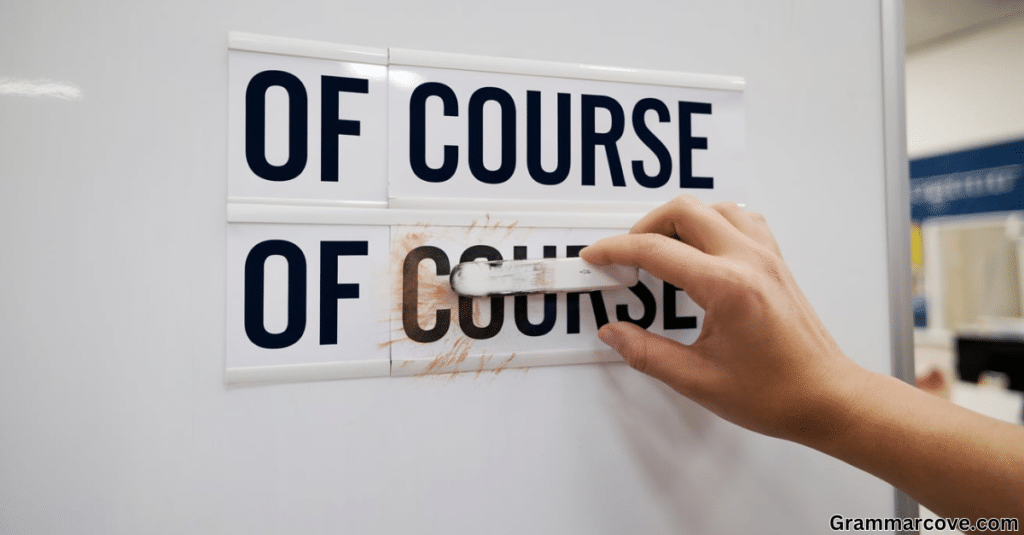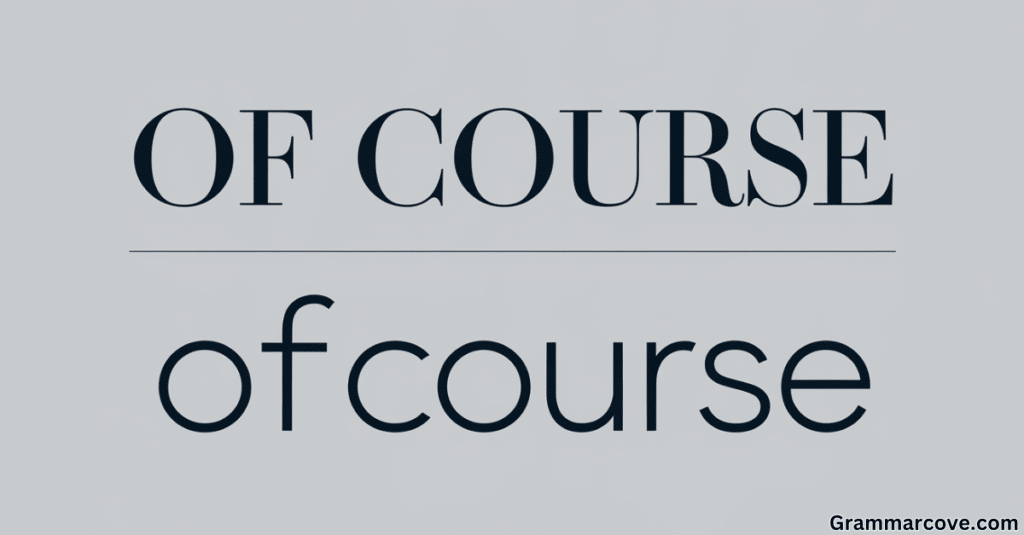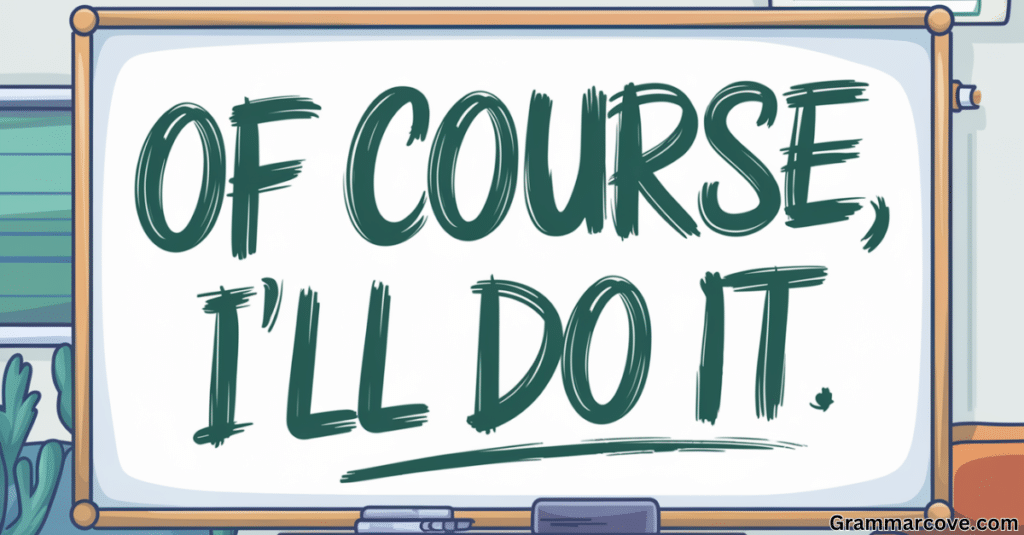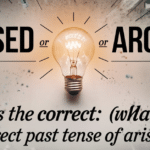In the world of English grammar, even the smallest details can make a big difference. When it comes to common phrases, it’s easy to wonder if you’re using them correctly—“of course” or “ofcourse”? Is there a right or wrong way to write this phrase, or does it depend on personal preference?
In this article, we’ll explore the correct spelling of this popular expression, what it means, when to use it, and common mistakes to avoid. By the end, you’ll have a solid grasp of how to use “of course” correctly and avoid the pitfalls that often confuse even native English speakers.
What Does “Of Course” Mean?

The phrase “of course” is a common idiomatic expression in the English language. It’s used to indicate agreement, assurance, or to express that something is obvious or self-evident. It’s a phrase that can convey certainty, politeness, or enthusiasm, depending on the context.
In everyday conversations, “of course” is used frequently as a response to requests, statements, or even questions. It’s a way of saying, “Yes, definitely,” or “Naturally, it’s expected.” You can use it in both informal and formal settings, though the tone might vary slightly.
Examples:
- “Can you help me with this task?”
“Of course! I’d be happy to.” - “Do you know how to get to the library?”
“Of course, it’s just down the street.”
You’ll also find “of course” being used in both written and spoken communication, making it a versatile expression in the English language.
Of Course vs Ofcourse: The Great Debate

Correct Spelling of “Of Course”
There’s no debate about the correct spelling of “of course”—it’s always two words. This two-word phrase is the only correct spelling according to standard English grammar rules. Writing it as “ofcourse” is incorrect and considered a spelling mistake.
You may have seen the term “ofcourse” used incorrectly in online articles, casual messages, or even emails. But this is simply a typographical error, and it’s important to remember that the correct form is “of course”—with a space between the two words.
The phrase “of course” has existed in English for centuries, and its structure hasn’t changed. While many words in the English language have undergone changes in spelling and grammar, “of course” remains fixed as two distinct words.
Ofcourse or Ofcourse Spelling: A Common Mistake
In some cases, people mistakenly write “ofcourse” as one word. This is particularly common when people type quickly or don’t pay close attention to their writing. This misspelling can also occur because “of course” is often spoken quickly and can sound like one word when pronounced.
While “ofcourse” might seem like a logical shorthand, it’s important to remember that in formal writing, especially in professional or academic contexts, “ofcourse” is always incorrect. Keeping these things in mind will help you avoid the common mistake.
For example:
- Incorrect: I’ll meet you at 7 PM, ofcourse.
- Correct: I’ll meet you at 7 PM, of course.
Ofcourse or Offcourse? Another Common Confusion
Another issue arises when people mistakenly write “offcourse” instead of “of course.” The two are often confused because they sound similar, but “off course” is a completely different phrase with a distinct meaning.
- Off course refers to something that has deviated from its intended path, whether physically, like a ship going off course, or metaphorically, like someone’s plans going astray.
- Of course, on the other hand, is used to express agreement, certainty, or an obvious fact.
Example 1: The Correct Use of “Of Course”
- Person 1: “Are you going to the meeting?”
- Person 2: “Of course! I wouldn’t miss it.”
Example 2: The Correct Use of “Off Course”
- Captain: “We’ve strayed off course. We need to recalibrate our navigation.”
Clearly, “off course” is used in a very different context than “of course.” Using “offcourse” as a misspelling of “of course” would be both incorrect and confusing.
When to Use “Of Course”?

Knowing when to use “of course” is just as important as knowing how to spell it. Below are several common scenarios where you can confidently use this phrase.
1. To Show Agreement
The most common use of “of course” is to express agreement. If someone asks you to do something and you want to affirm that it’s no trouble, you can reply with “of course”.
Example:
- Person 1: “Can you help me with this project?”
- Person 2: “Of course, I’d be happy to assist.”
This usage works in both personal and professional settings.
2. To Express Certainty
You can use “of course” to indicate that something is self-evident or certain. It often adds an extra layer of emphasis when you want to reassure someone that the answer is obvious or unquestionable.
Example:
- Person 1: “Do you know how to solve this equation?”
- Person 2: “Of course, it’s simple!”
In this case, “of course” shows that the responder is confident and has no doubts about the answer.
3. To Offer Polite Refusals
Of course isn’t just for saying “yes”; it can also be used to politely refuse something, especially when you’re explaining why you can’t do something.
Example:
- Person 1: “Can you meet me later today?”
- Person 2: “I’m sorry, but of course I can’t, I have another commitment.”
This usage allows you to show that your refusal is polite, yet firm.
4. To Emphasize a Point
In some cases, “of course” is used to emphasize a statement, reminding the listener of something obvious or generally accepted.
Example:
- “Of course, we need to finish the report by Friday; it’s due then!”
5. In Email Responses and Professional Communication
“Of course” is also commonly used in emails, especially in the context of confirming information or agreeing to help. It’s polite, friendly, and assures the recipient that you understand the request and are willing to help.
Example in an Email: Subject: Assistance with the Report
Dear John,
Thank you for your email. Of course, I can assist with that. I’ll start gathering the necessary data and send you the initial draft by tomorrow.
Best regards,
Sophia
This demonstrates how “of course” can be used in a professional setting to show both certainty and willingness to help.
Common Mistakes in English: The Misspelling of “Of Course”

Spelling mistakes are common, and “of course” is one phrase that often trips people up. Understanding the reasons behind misspelled words in English, especially when it comes to commonly confused phrases like “of course,” will help you avoid these errors in your own writing.
Some of the most common mistakes include:
- “ofcourse”: A typo that happens because people think the two words should be written together.
- “offcourse”: A more serious mistake that occurs when people confuse the idiom with the phrase “off course.”
Writing Tips to Avoid Mistakes
- Always proofread your writing, especially when using commonly confused phrases like “of course.”
- Use spell-check tools or grammar checkers to catch potential typos or errors.
- Familiarize yourself with English grammar rules regarding common phrases and spelling.
- If you’re unsure, double-check with a dictionary or style guide.
Of Course Synonyms: Expressing Certainty and Agreement
If you find yourself repeating “of course” in your writing, don’t worry—there are plenty of synonyms you can use to keep your communication varied and interesting. Some alternatives include:
- Certainly
- Absolutely
- Naturally
- Sure
- Without a doubt
Example in Writing:
Subject: Confirmation of Meeting
Hi Emma,
Naturally, I’ll be able to attend the meeting tomorrow at 10 AM. Looking forward to it.
Best,
Jacob
By using these synonyms, you can add variety to your communication and avoid sounding repetitive while still expressing the same level of certainty or agreement.
Table: Common Misuses of “Of Course”
| Incorrect Usage | Correct Usage | Explanation |
|---|---|---|
| ofcourse | of course | Misspelling of the two-word phrase |
| offcourse | off course | Refers to deviation from a course or plan |
| ofcourse | of course | Typographical error often seen in casual writing |
Conclusion: The Final Word on “Of Course”
Now that we’ve explored the differences between “of course” and its common misspellings, it’s clear that “of course” is the only correct form of this expression. Whether you’re confirming something, agreeing, expressing certainty, or even politely refusing, “of course” is an incredibly versatile phrase that can be used in a variety of contexts.
Avoid using “ofcourse” or “offcourse” in your writing, as both of these are incorrect and can confuse your audience. By keeping this simple rule in mind, you’ll ensure that your communication is both professional and grammatically correct.

Steel Morgan is an experienced blogger passionate about language and writing. On Grammarcove. he shares his expertise in grammar, punctuation, and effective communication, making complex rules simple and accessible for readers. With a knack for clear explanations and engaging content, Steel aims to help others master the art of language.







